Explore all of the ACLU of Massachusetts’ analysis on policing in the Commonwealth.
In response to the recent egregious murders of George Floyd, Breonna Taylor, Ahmaud Arbery, and Tony McDade, and the nation has seen historic numbers mobilizing and protesting the anti-Black criminal legal system. Advocates across the country have intensified their calls for the government to take action against police abuse, with suggested responses spanning from large-scale defunding to total disbandment of police departments.
Here in Boston, substantial pressure is building to #DefundPolice. Due to monumental organizing efforts by groups such as the Muslim Justice League and Families for Justice as Healing, the Boston City Council received an unprecedented amount of public feedback urging defunding for the June 4 hearing on external grants funding the Boston Police Department (BPD).
Yet these external grants, totaling $2.6 million, are small potatoes compared to the full $414 million the City of Boston has proposed to fund the BPD in Fiscal Year 2020-2021 (FY21), and that the Boston City Council is slated to approve on Wednesday, June 10. Here the ACLU of Massachusetts presents a detailed analysis of how the Boston Police department uses its outsize share of taxpayer dollars.
Access and share this blog published in the form of a report here.
How much money does the BPD get?
The Boston Police Department budget dwarfs that of not only other City departments, but of entire City cabinets (where cabinets administer multiple departments). The FY21 budget proposes a $414 million budget for the Boston Police Department – the second largest line item in the entire city budget, second only to Boston Public Schools.
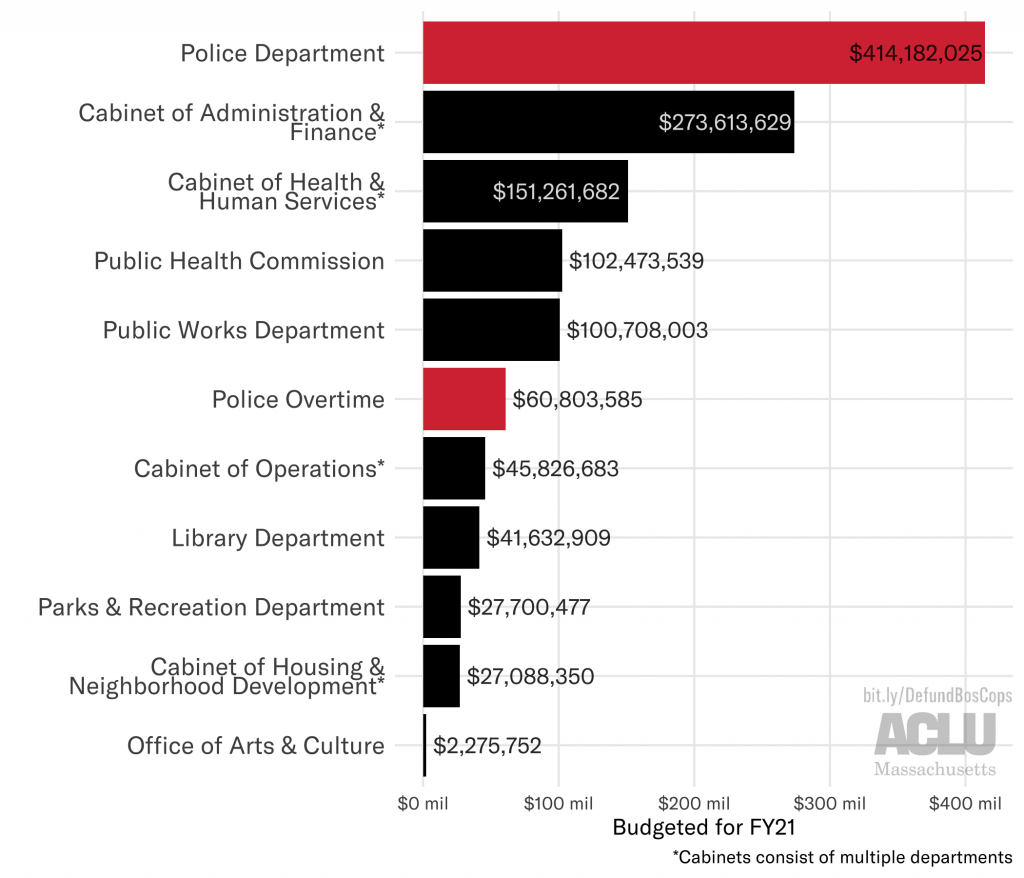
Compared to the budgets of other Boston City departments (and cabinets), the Boston Police budget is:
- 1.5x larger than the Cabinet of Administration and Finance (which constitutes 17 individual departments)
- 2.7x larger than the Cabinet of Health and Human Services (which constitutes 9 individual departments)
- 4x larger than the Public Health Commission
- 10x larger than the Library Department
- 15x larger than the Neighborhood Development Department
- 182x larger than the Office of Arts & Culture
Especially given that we continue to face the worst global pandemic in a century, with no vaccine in sight, the fact that the Boston Police Department expects to receive four times the funding of the Boston Public Health Commission is simply unconscionable.
It’s also important to note that the BPD funding is not limited to what is adopted in the City of Boston’s operating budget. Funding to Boston’s separate Office of Emergency Management and other state and federal grants further deepen the BPD’s proverbial pockets.
What is the FY21 budget changing?
Compared to FY20, the total amount of the BPD budget for FY21 is essentially unchanged. However, funding for personnel is being quietly reallocated within the budget in concerning ways.
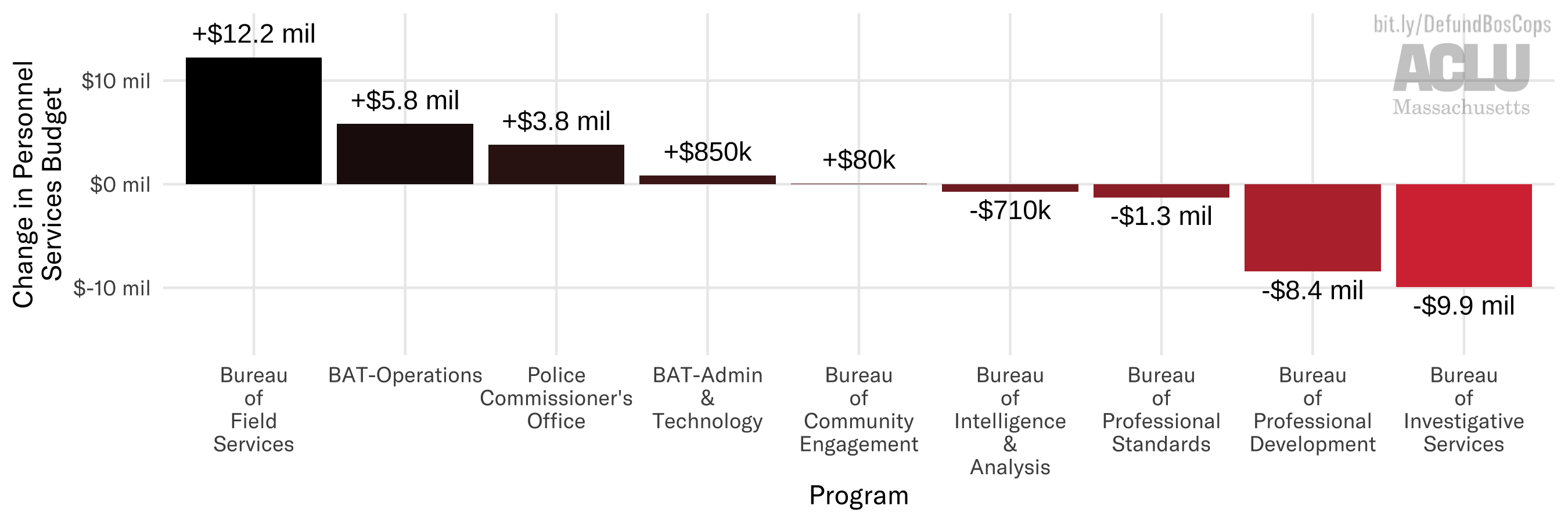
Comparing the different programs within BPD, the Bureau of Field Services is seeing a $12.2 million increase in personnel funding in FY21. This increased funding supports hiring 25 new officers, as well as raises and bonuses for existing officers. At the same time, the Bureau of Professional Standards and the Bureau of Professional Development see personnel cuts of a cumulative $9.7 million.
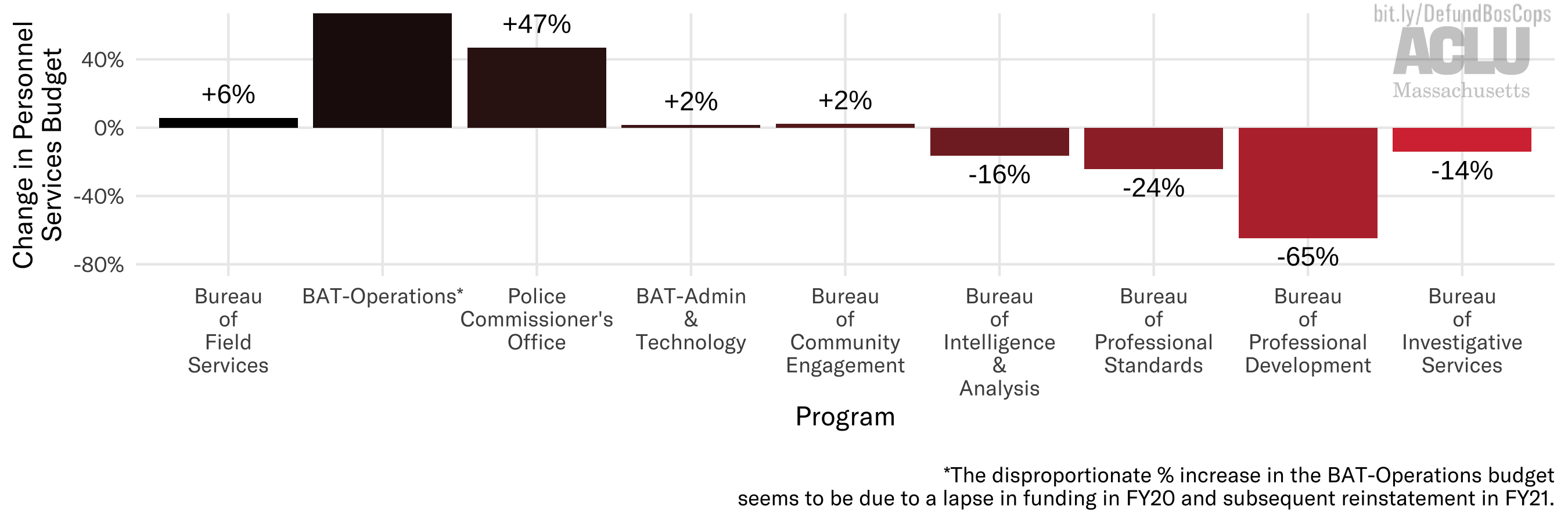
Looking at these raises and cuts as percentages of the FY20 personnel budgets, it becomes clear just how massive these cuts to the professional bureaus are – constituting 24% of the FY20 budget for the Bureau of Professional Standards and 65% of the FY20 funding for the Bureau of Professional Development.
What exactly do these bureaus do? The Bureau of Professional Standards includes the BPD’s Anti-Corruption Division and its Internal Affairs Division; the Bureau of Professional Development includes the Police Academy and Firearms Training programs. Simply put, the BPD programs focused on ensuring professionalism and accountability are being slashed.
How much do BPD employees get paid?
Beyond scrutinizing the City’s funding of the BPD, it is also prudent to examine how these funds are distributed to the Department’s employees, and how BPD’s compensation compares to that of other City officials.
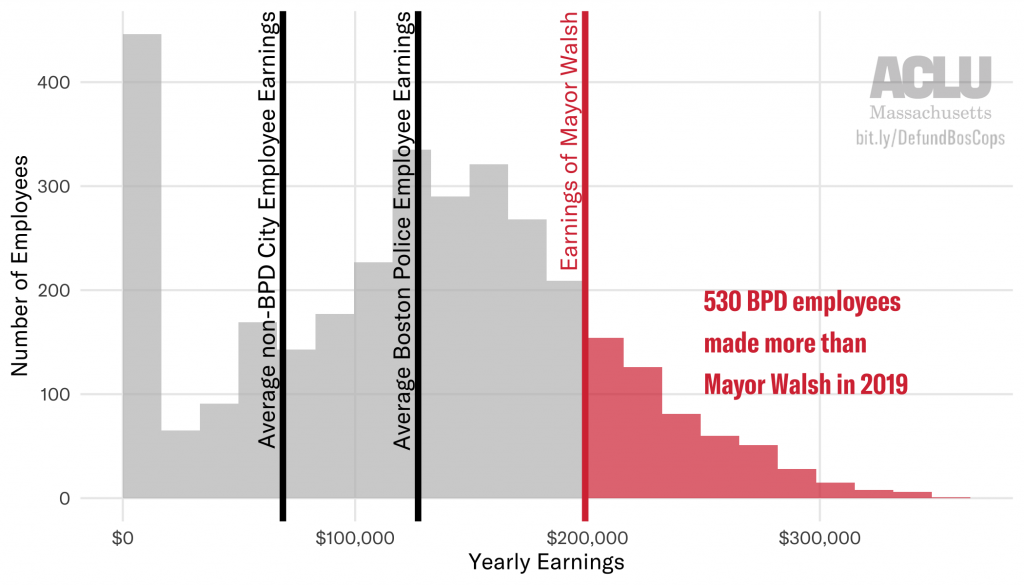
Employee earnings from 2019 show that BPD employees have some of the highest earnings in the entire City of Boston. Indeed, in 2019 the average BPD employee’s yearly earnings were $127,000, while the average non-BPD City employee’s yearly earnings were $69,000 – a whopping difference of $58,000.
Even Boston’s Mayor Marty Walsh can’t compete – 530 BPD employees made more than the mayor’s $199,000 earnings in 2019. All in all, in 2019 BPD employees made up 15 of the top 20 highest-paid Boston employees.
And, concerningly, the vast majority of high-earning BPD employee’s pay seems to come from sources other than their base salary.
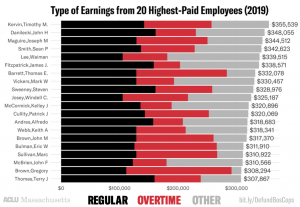
None of the highest-earning BPD employees received over 60% of their income from base salary (regular) wages. Overtime, detail, and unspecified “Other” pay categories massively buffer their earnings.
Altogether, the 20 top BPD earners took home $1,971,778 in overtime pay in 2019.
For a great interactive chart showing the earnings of the almost 3,000 people on the BPD payroll, check out this public data viz by Dawn Graham.
What’s that about overtime?
The Boston Police Department estimates its employees will use over 1,200,000 hours of overtime in 2020. Spread over a 52-week year and a workforce of 2898 full-time equivalents (FTEs), 1.2 million hours breaks down to:
- 23,500 overtime hours BPD-wide per week
- 420 overtime hours (2.5 months) per BPD employee per year
- The equivalent of hiring over 570 new full-time employees
And at $60.8 million, the BPD overtime budget makes up 15% of the entire BPD budget. When compared with other Boston City department budgets, the BPD overtime budget alone is:
- 1.3x larger than the Cabinet of Operations (which constitutes 3 individual departments)
- 2x larger than the Parks & Recreation Department
- 11x larger than the Mayor’s Office
- 15x larger than the Cabinet of Civic Engagement
- 240x larger than the Human Rights Commission
This trend is not typical among Boston City employees. Just 7.1% of the earnings of all City of Boston employees were categorized as overtime, yet 18.7% of the BPD earnings came from OT.
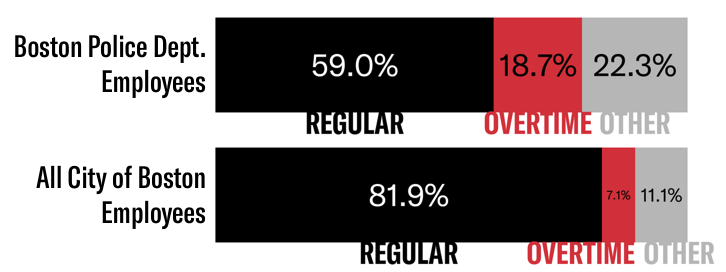
This exorbitant overtime pay comes from a number of city and state policies, including an effective monopoly on police operating details at construction sites and a required four-hour minimum pay for any appearance in court.
And what’s more, the BPD have been repeatedly caught fraudulently abusing overtime pay – in 2012, 2016, and 2019.
Where do these data come from?
The data we present here are collected from a number of sources:
- Boston City Council documents
- Packet submitted to the Boston City Council by the BPD in advance of the budget hearing
- Boston City budget website
- Overview of proposed citywide FY21 operating budget
- Boston public safety cabinet (including the office of emergency management, fire department, and police department) adopted FY18-20 and proposed FY21 budget, including line items by accounts payable, list of department personnel & salaries, and list of external funds
- Boston’s open data portal
- Proposed and adopted operating budgets from 2018-2021, broken down by cabinet, department, and program
- City of Boston 2019 employee earnings report
What to do about it
We encourage you to read through the Muslim Justice League’s Defund Boscops Toolkit where they lay out strategy for defunding the Boston Police, including detailed sample testimony.
Some immediate political actions include:
- Call or email Boston Mayor Marty Walsh and Boston City Councilors on the Ways and Means Committee before the final budget vote on Wednesday, June 24, urging them to reject and reduce the current budget’s inflated funding of the BPD
- Tell your Massachusetts legislators to defund police and invest in communities
- Sign a petition to defund Boston police, run by the Youth Justice and Power Union, Roxbury Environmental Empowerment Project, and The City School
- Get involved with a statewide movement to #DefundPrisons with this fantastic toolkit from Families for Justice as Healing and the Building Up People Not Prisons Coalition
Systemic police abuse against Black Americans and peaceful protestors is enabled by massive, unchecked police funding – exactly what we see in the City’s budget for the Boston Police Department.
Now more than ever, we must hold cities, states, and police departments accountable by publicizing the contents of their pocketbooks and urging our legislators to divest and #DefundPolice.
This report and analysis was authored by Lauren Chambers (ACLUM) with the guidance of Kade Crockford (ACLUM) and Fatema Ahmad (MJL).
A previous version of this blog incorrectly cited the final Boston City Council budget vote as being on June 10th. It is actually on June 24th.
